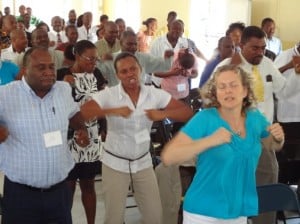So much happens to all of us in the Jacmel training as we go deeper, become more aware, take chances, and connect over five days.
Our faculty faces fears of not performing well, of not sleeping at night, and of missing what is muffled in translation. We take the chance of feeling our uncertainty of daily supervision and are gratified that our colleagues have at least as much compassion for us as we feel for those we are helping.
The interns are stars, setting examples of emotional risk taking and taking care of business: filling in where the translator is a bit off, pointing out what faculty may have missed, and making sure, as if they have invited all of us into their own homes, that we are well cared for in lines at lunch, during the lectures, and at the beginning and end of each day.

I see the participants grow more receptive each day, feel them more engaged with every exercise we do. Men and women who have never heard of, let alone participated in, psychotherapy are exquisitely sensitive to each others’ complex feelings and thoughts, and us. Often without words, old and young, farmers as well as physicians, create a climate of acceptance in which everyone–and I really do mean everyone–seems to feel safe.
The suspicion and rancor among religious groups–Catholics, Protestants, Vodoun Healers—is palpable in the early days. Though the saying has it that Haiti is 80% Christian and 100% Vodoun, some of the Christians seem quite fearful. “Who are these Vodoun people?” They ask with uneasily politeness. By the last day, after having sat in the same small groups, most of them seem at ease. “We are just people” says Clement, who heads the Jacmel Vodoun Healers Association. “I feel like these people are my family,” and the nuns in their habits and scripture-quoting-Protestants nod their heads.
Nature is so important. In drawing after drawing on the final day, the restoration of hope is symbolized by new trees, green and blue where there was, on the first day, only brown.
If it is possible, community is even more important. The final day’s drawings of the goal each participant would hope to reach are crowded with family, friends, and neighbors. When the groups come to the front of the grande salle to receive their certificates of completion, they sing songs to their leader and intern, and to themselves, and they call themselves “family”.
Already on the first evening many of the participants are sharing what they’ve learned with children, spouses, and parents. On the fifth and last day, they are, without being asked, pledging to take “CMBM,” this work, to their schools, churches, clinics, and to everyone in their communities. Linda has to slow them down a bit. “Sharing with your friends and family is good, but you need to practice much more. You are just learning. When we have the Advanced Training in November we will teach you how to lead groups.”


